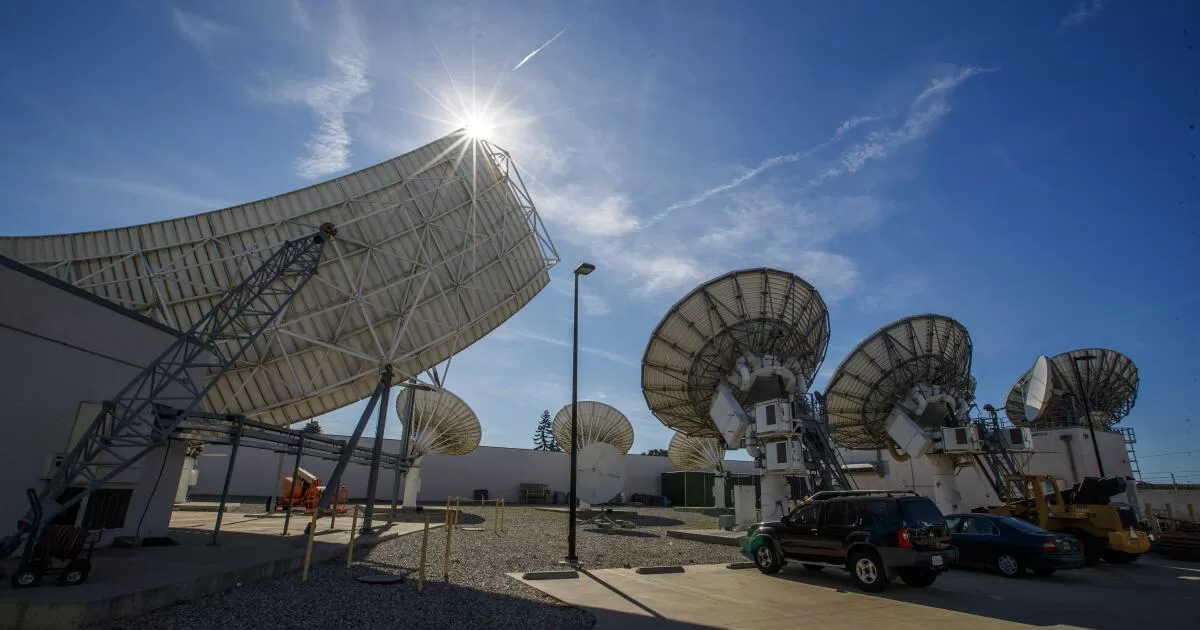Satellite TV provider DirecTV has agreed to buy longtime competitor Dish Network, throwing a lifeline to the troubled Colorado-based broadcaster that helped pioneer the industry.
The proposed consolidation, announced early Monday, highlights the challenges facing traditional television. DirecTV agreed to assume Dish’s net debt and pay just $1 for Dish’s satellite TV business and streaming service Sling TV — a startling admission about the fading prospects of the once prominent satellite television provider and its Englewood, Colo.-based parent, EchoStar Communications.
The deal is expected to unfold in two separate transactions. Private equity firm TPG plans to acquire AT&T’s majority stake in DirecTV, giving TPG full ownership of the El Segundo-based company.
Separately, DirecTV agreed to assume $9.9 billion of Dish’s debt at the close of the EchoStar transaction. The proposed takeover, structured as a debt exchange, would allow DirecTV to boost its subscriber count with Dish’s more than 8 million homes. DirecTV currently has about 10 million subscribers for its namesake service and U-Verse.
“We think this is the right deal for consumers,” DirecTV Chief Executive Bill Morrow said in an interview. “We think [satellite TV] has a greater life and a greater value than most people realize.”
The deal includes arrangements for EchoStar to quickly receive a $2.5-billion loan so it can restructure debt. The cash infusion is designed to help EchoStar and its billionaire chairman Charlie Ergen meet a looming debt payment and continue efforts to build a wireless phone service, branded as Boost Mobile.
Ergen, the 71-year-old maverick who co-launched EchoStar in 1980 when he and his wife sold satellite dishes door to door, would exit the television business. That would mark a significant milestone as Ergen helped Dish leap to life in 1996 — two years after DirecTV launched its nationwide service.
The Dish-DirecTV consolidation is expected to face regulatory scrutiny.
In 2002, the Federal Communications Commission thwarted the companies’ first stab at a union. The FCC ruled a marriage of DirecTV, then owned by Hughes Electronics Corp., and EchoStar’s Dish Network, would choke competition by shrinking the field of satellite TV providers from two companies to just one. At the time, satellite TV was a leading option for residents of rural communities that lacked cable.
The business has changed dramatically since then. Tech giants Netflix, Amazon Prime Video and Google’s YouTube TV have gobbled up a huge part of the television distribution business, and both Dish and DirecTV have been bleeding customers. The two firms have lost more than 60% of their customer base since 2016.
“There’s more competition than ever. It’s not just cable TV and satellite TV anymore,” Morrow said. “We are the ones in the minority; we’re the ones that are dropping like flies.”
The regulatory review is expected to take about a year, the companies said.
“It’s hard to imagine that regulators would block a deal,” telecommunications industry analyst Craig Moffett wrote in a recent email. “Better to have one than none.”
Ergen’s company has been staggering under a heavy debt load. Negotiations with lenders to restructure its payments broke down this summer, EchoStar said in a recent filing.
The company faces a $1.98-billion payment in mid-November, which prompted some analysts to predict that a bankruptcy was imminent.
EchoStar had just $521 million available in late June. In the second quarter, the company sustained steep declines in revenue and traditional TV customers. The Sling TV business, however, showed improvement.
EchoStar shares have gained ground in recent weeks amid rumors of a deal with DirecTV. Shares closed Friday at $28.04, up 9%.
“This agreement is in the best interests of EchoStar’s customers, shareholders, bondholders, employees, and partners,” Hamid Akhavan, EchoStar chief executive, said in a statement announcing the deal. “We expect Dish and DirecTV bondholders to benefit from two companies with stronger financial profiles and more sustainable capital structures.”
TPG, which currently owns 30% of DirecTV, will cover the bulk of the $2.5-billion loan to EchoStar. TPG’s Angelo Gordon division will handle the financing.
AT&T is expected to exit its ownership stake of DirecTV in the second half of next year, bringing to a close its disastrous foray in the entertainment business.
AT&T bought DirecTV in 2015 for about $67 billion, including debt, and then presided over an unraveling of the business.
In 2021, AT&T spun off DirecTV and U-Verse into a stand-alone company, and brought in TPG as managing partner.
The Dallas phone giant separately also sold Warner Bros. Discovery in 2022 for $43 billion — half the amount AT&T paid in 2018 to become a player in Hollywood. The company since has been focused on its wireless business.
The Dish Network and Sling TV businesses are carrying about $11.5 billion in debt.
“We don’t think the value is there to carry that [much debt],” Morrow said. “There’s virtually no equity in the company.”
While DirecTV agreed to absorb nearly $10 billion of Dish debt, that component is conditional on bondholders accepting less than Dish’s current obligations. The goal, according to Morrow, is to reduce Dish’s debt by $1.6 billion, making it a more manageable load.
The deal is also subject to regulatory approval.
“It’s hard to argue that a merger shouldn’t happen; it clearly should,” Moffett said. “Consolidation during a period of secular decline is always to be expected.”
